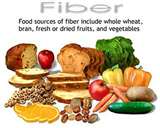Fruits, vegetables, nuts, seeds, legumes and grains are good sources of dietary fiber. It is the component of food that cannot be digested or broken down into energy.
Foods rich in fiber are loaded with vitamins, minerals and phytonutrients. It comes solely from plants and none from animals.
Chemically, dietary fiber consists of non starch polysaccharides (complex carbohydrates) and other plant components like cellulose, pectin and wax.
The two basic types of dietary fiber are soluble and insoluble. The former dissolves and breaks down in water and forms a thick gel while the latter, also known as ‘roughage’ does not dissolve in water or break down in the digestive system, and simply passes through the gastrointestinal tract almost without change.
It is important to have both soluble and insoluble fiber in your diet because of the benefits we can derive from them. Fruits and vegetables contain more useful fiber when eaten raw than those that had been peeled, pureed or processed.
Dietary fibers work wonder to your health by:
*** Preventing Cardiovascular disease – The fiber lowers cholesterol, blood pressure and itself contains natural anti-clotting agents which can help prevent blood clots that can trigger heart attacks. The American Heart Journal reported evidence that high fiber diet slows atherosclerosis, which is the build-up of plaque in the arteries.
*** Enhancing Weight Loss – Fiber can curb your appetite and helps reduce absorption of calories from food and manages to remove calories and take them out before they become part of the body. Fiber rich foods are low calorie density foods which permits one to eat lots of food without lots of calories but with plenty of nutrients. Fiber slows the conversion of carbohydrates to blood sugar, thus allows glucose to be burned efficiently instead of being stored as fat.
*** Preventing Digestive Diseases – Fiber helps ease many uncomfortable symptoms in the digestive system like bleeding of the colon, bloating, abdominal pain, diarrhea and constipation, because it lowers the pressure inside the large intestine or colon, allowing bowel to move through easily. By promoting a clean bowel, fiber allows the body’s natural useful bacteria known as ‘flora’ to flourish. Useful bacteria helps fight off diseases and infections.
*** Regulating Blood Sugar Levels For Diabetics – Type 2 diabetes, the most common type, occurs when the body becomes insulin resistant and cannot control blood sugar levels. Fiber slows the movement of food out from the stomach and this gradual release of food in the presence of fiber slows the absorption of glucose into the blood, enabling a controlled insulin response, thus the level of blood sugar remains steady.
*** Fighting Breast Cancer & Eliminating Cancer Causing Carcinogens – Fiber helps fight breast cancer. Tumor growth is stimulated by estrogen in breast cancer. Fiber binds with estrogen and pushes it out of the body through normal bowel elimination, thus lowering the body’s estrogen level. Since fiber acts as a bulky agent, cancer causing carcinogens are eliminated from the body more quickly.
*** Preventing Alzheimer’s and Dementia – Swedish scientists have established that people who control their weight, cholesterol and blood pressure through high fiber diet can significantly decrease the possibility of dementia and Alzheimer’s.
When you are in high fiber diet, it is important to drink plenty of water about 6 to 8 glasses a day to help digest fiber. Eat a variety of food sources of fiber, as excessive fiber from a single source can inhibit the absorption of other nutrients. Increase intake of fiber gradually to avoid bloating or diarrhea.
